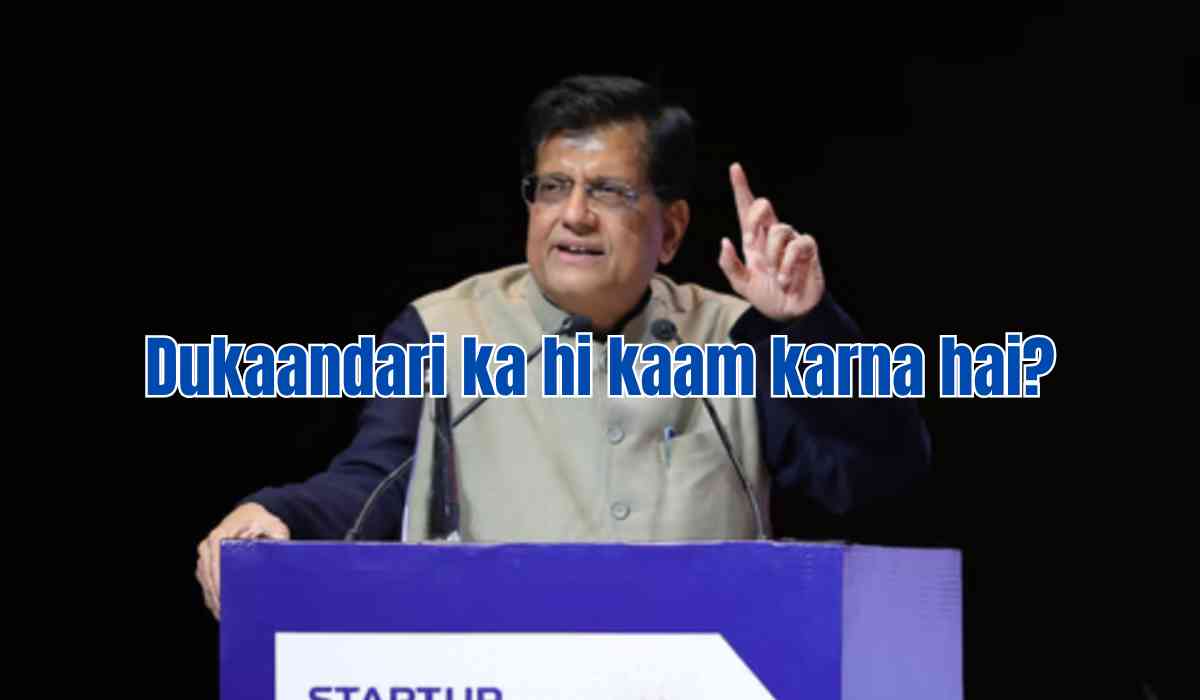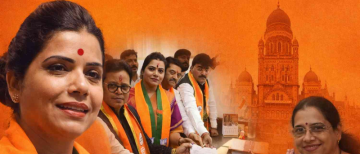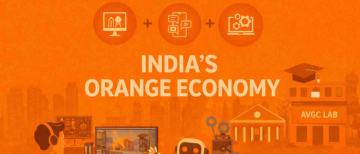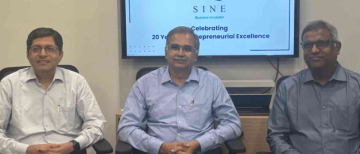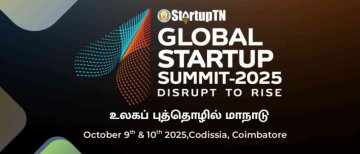At the recently concluded Startup Mahakumbh 2025, Commerce and Industry Minister Piyush Goyal delivered a bold and critical assessment of India’s startup ecosystem. In a series of powerful statements, Goyal highlighted the worrying trend of startups prioritizing convenience-driven services over deep-tech innovation — a path that, he warned, could limit India’s long-term economic and technological progress.
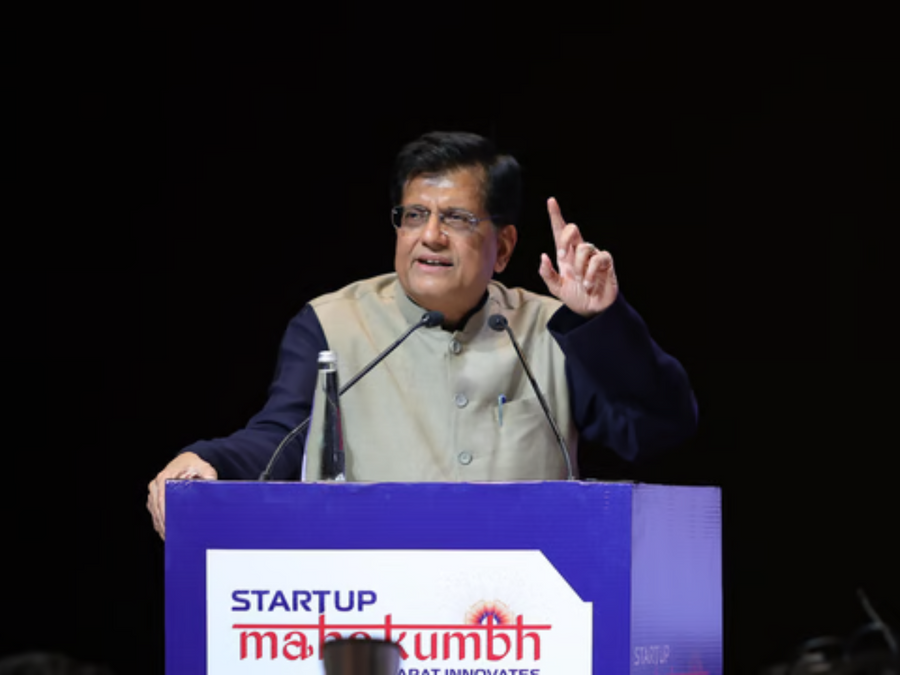
“Fancy Ice Creams or Semiconductors?”: The Startling Analogy
Goyal’s now-viral comparison of “fancy ice creams” versus semiconductor development underscores his central critique—that Indian startups are becoming increasingly focused on luxury consumer goods, quick commerce, and hyper-fast logistics, while countries like China are surging ahead in semiconductors, AI, robotics, and EV battery technologies.
"I have no complaint against that, but is that the destiny of India—healthy ice cream, zero gluten-free, whatever, vegan?"
While praising the scale achieved by Indian unicorns in the food delivery and convenience sectors, Goyal questioned whether this trajectory truly represents India’s technological aspirations.
The Harsh Reality: A Startup Ecosystem Built on Short-Term Convenience
Goyal didn't hold back in pointing out how many of India’s startups—especially in the food delivery and instant grocery space—may be offering short-term consumer convenience, but aren’t contributing long-term economic or technological value.
Key Critiques:
-
Over-reliance on gig workers: Startups turning unemployed youth into cheap labor for food delivery.
-
Foreign ownership of Indian innovation: Bright startup ideas being sold to foreign investors for just ₹50–60 lakh.
-
Shallow innovation: Business models rooted in urban elitism, not nation-building tech.
-
Low Indian investor participation: Excessive dependence on foreign capital, limiting domestic control and wealth creation.
“I only wish they had more Indian investors rather than foreigners buying off all our startups.”
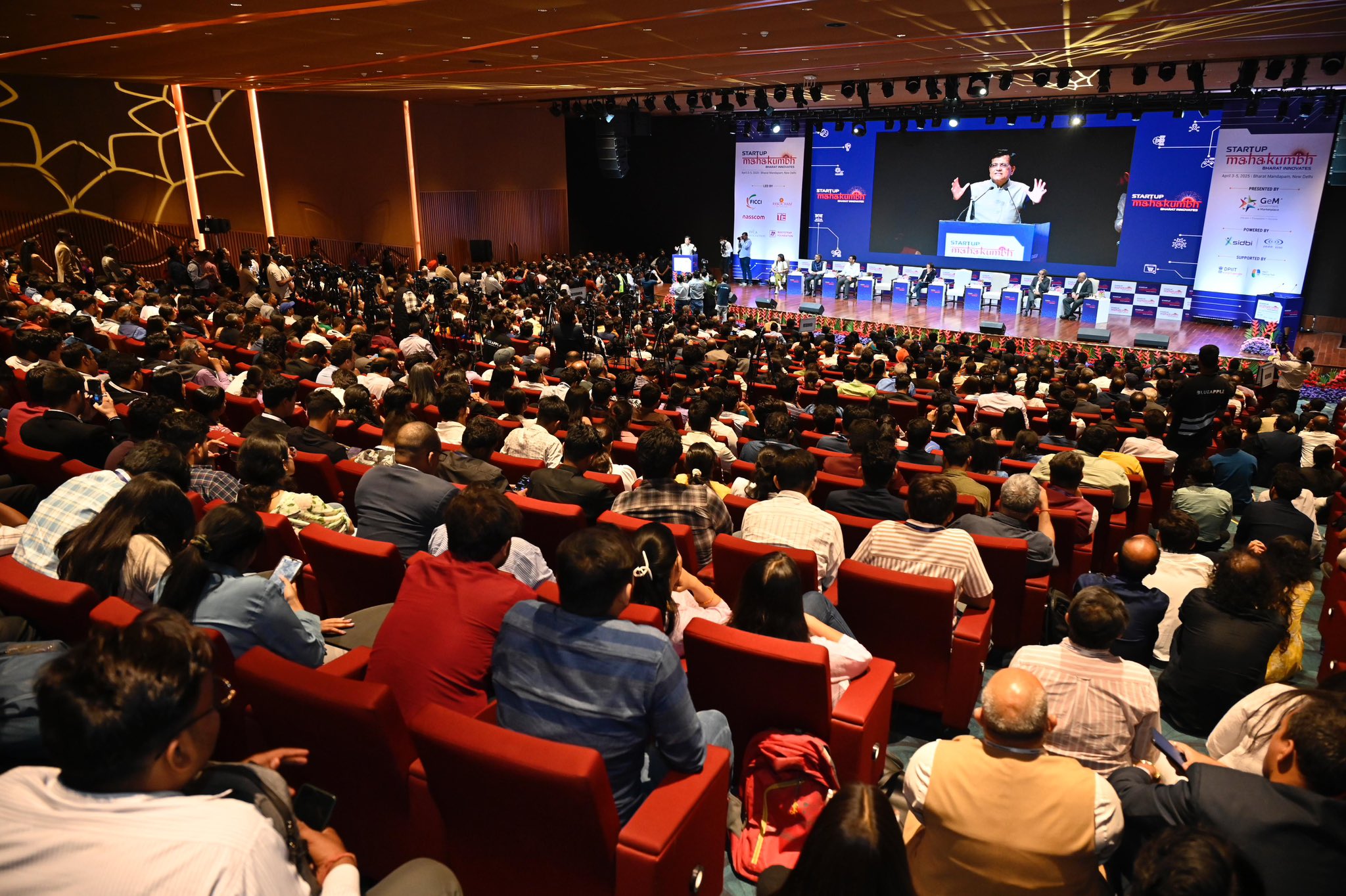
The India vs China Startup Reality Check
One of the core themes of Goyal’s address was a direct comparison between India and China — two of the world’s largest startup ecosystems. India is currently the third-largest startup ecosystem globally, but Goyal emphasized that size alone does not equate to impact.
We are very proud of what India has done, but are we the best in the world as yet? Not yet.
China is developing semiconductors and AI models. So, what does India want to make? Ice cream or semiconductor chips?
The most striking part of Goyal’s address was his comparison of the Indian and Chinese startup ecosystems.
China’s Focus Areas:
-
Semiconductors
-
Electric Vehicles (EVs)
-
AI model development
-
Robotics and Automation
India’s Focus Areas (as criticized):
-
Delivery apps
-
Gourmet food startups
-
Instant grocery services
-
D2C luxury snacks and desserts
Goyal questioned the long-term value of businesses centered around “fancy cookies” and ultra-fast logistics, comparing them unfavorably to global tech advancements happening in other major economies.
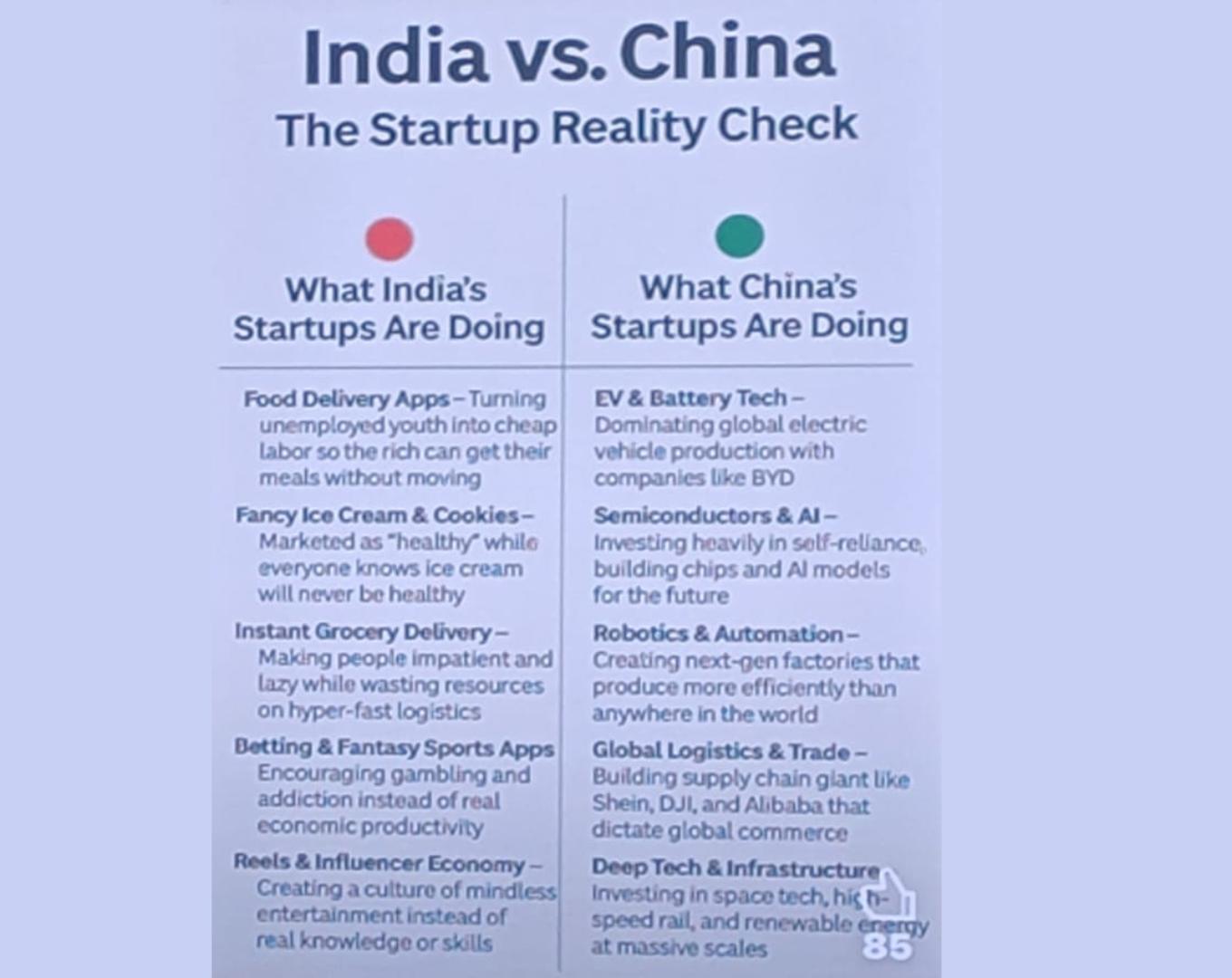
The Deep-Tech Deficit: Only 1,000 Startups in the Sector
Despite India’s celebrated startup boom, Goyal revealed a troubling statistic: only around 1,000 startups in India are involved in deep-tech sectors like:
-
Semiconductors
-
Artificial Intelligence
-
Robotics
-
Electric vehicle batteries
-
Advanced manufacturing
He called this a “disturbing situation” given India’s ambition to sign trade deals with the US, EU, and Australia and compete with the best globally.
“We need to move beyond creating businesses that don’t have any real value. Hyper-fast logistics may seem glamorous, but they are not shaping the future of the nation,” Goyal emphasized.
“We may do all sorts of international trade agreements and have ambitions to compete with the best in the world, but I can’t take grocery stores to them and say this is India’s offering for startups.”
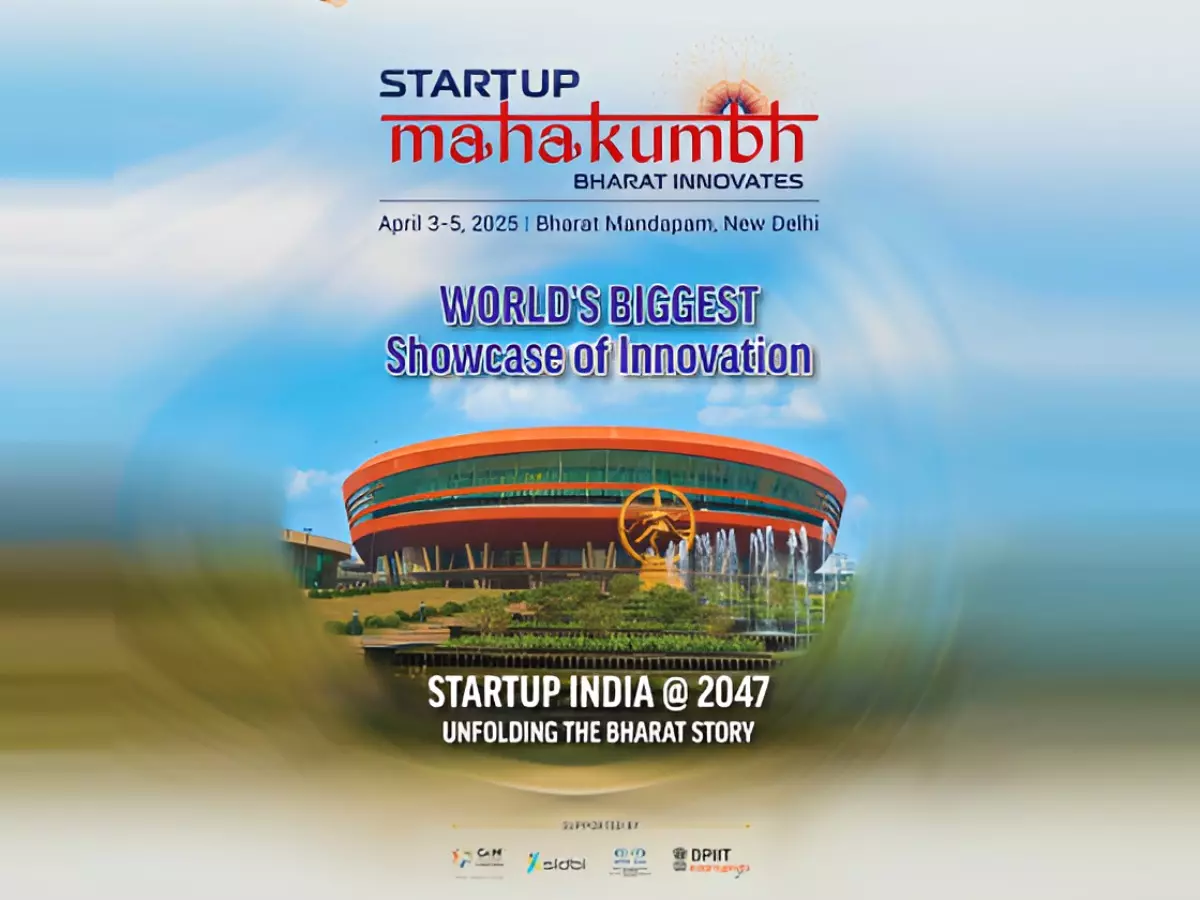
Convenience vs. Innovation: “Are We Happy Being Delivery Boys and Girls?”
The minister’s message was clear: India must evolve beyond quick wins and viral apps. While Goyal did not dismiss the success of unicorns in the convenience economy, he insisted that such ventures should not define India's innovation identity.
He critiqued startups founded by wealthy families focusing on premium food products, asking:
“Is that the destiny of India—healthy ice cream, zero gluten-free, whatever, vegan?”
Instead, he encouraged founders to focus on building technologies that solve real-world challenges, contribute to industrial growth, and position India as a global tech powerhouse.
Goyal posed a blunt question to entrepreneurs:
“Dukhandari ka hi kaam karna hai ya vishwavyapi aur international scale par Bharat ki pehchaan banani hai?”
Role of Investors and Media: A Word to Shark Tank and Aman Gupta
Goyal called upon Indian investors and influencers—especially those in the public eye such as Aman Gupta of boAt and others from Shark Tank India—to re-evaluate their startup mentorship.
He encouraged mentors to back sustainable, future-proof business models, not just viral D2C products.
He asked:
“Are we mentoring startups for sustainable, long-term growth or just viral, quick-profit products?”
Capital Crisis and Brain Drain
Goyal expressed deep concern over the cheap sale of Indian innovations to foreign companies. Many promising ideas, he noted, are being sold for as little as ₹50-60 lakh, leading to a persistent brain drain.
Goyal’s Call to Action:
Unicorns and Indian industry bodies like CII, FICCI, and Assocham should:
-
Pool capital to support domestic innovation.
-
Create funds for scaling deep-tech startups.
Indian investors need to play a bigger role.
“I only wish they had more Indian investors rather than foreigners buying off all our startups.”
He urged stakeholders to create enabling ecosystems where Indian founders don't have to look abroad for funding or validation.
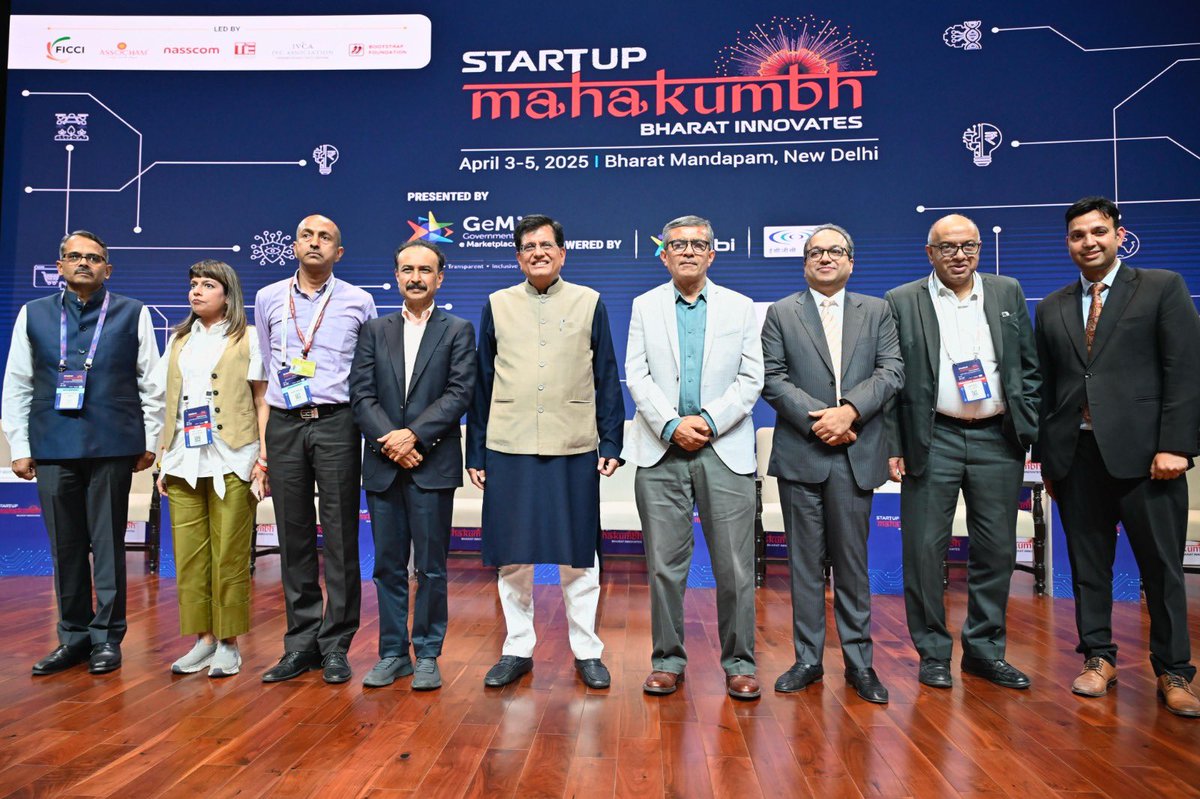
Creating a Culture of Curiosity and Creativity
Beyond immediate policy and investment changes, Goyal emphasized the need for a mindset shift starting from the education system.
Key Educational Reforms Urged:
-
Foster curiosity, critical thinking, and creativity in children from a young age.
-
Prepare students to become problem-solvers and inventors.
“We must inspire the next generation to think creatively and work towards groundbreaking solutions, which are the true drivers of economic growth.”
Viksit Bharat 2047: A Vision That Requires Bold Innovation
Goyal concluded with a call to action for startup founders to become the “sculptors of New India.”
Under Prime Minister Modi’s leadership, he said, India is not settling for small achievements but aiming to compete with the best in the world through:
-
Strategic international trade deals with the US, EU, and Australia
-
Global-scale ambitions for Indian tech
“We'll need to go global, think big, be ambitious, experiment, and go beyond the boundaries of our own thinking.”
Backlash from the Startup Community
Goyal’s remarks, while applauded by many, sparked strong reactions from startup veterans.
Aadit Palicha (Zepto Co-founder):
“We need to build great local champions in internet that generate hundreds of millions of dollars in FCF if we ever want to get a piece of great technology revolutions.”
“The government should back the creation of ‘local champions’ and not pull down the teams trying to bring ‘technology revolutions’.”
Mohandas Pai (Former Infosys Executive & VC):
“These are bad comparisons. Goyal should not belittle our startups but ask what he has done to help deep-tech startups grow.”
“Goyal should not belittle our startups but ask himself what he has done to help deep-tech grow in India. It’s easy to point fingers.”
Pai also criticized the government’s tax policies, investment restrictions, and regulatory red tape, claiming these have discouraged growth in the very sectors Goyal wants to promote.
A Startup Crossroads
Piyush Goyal’s fiery address at Startup Mahakumbh 2025 has reignited a crucial debate: Should India’s startup story be about convenience or core innovation? His speech was not just a critique, but a wake-up call — a reminder that vision without support, and ambition without execution, will not make India a global leader in innovation.
To move from “fancy ice cream” to semiconductors, from delivery apps to AI labs, Indian startups must be backed not only by visionary founders but also proactive policies, domestic capital, and deep-tech mentorship.
India stands at a crossroads. The direction it chooses now will define its startup legacy for generations to come.
With inputs from agencies
Image Source: Multiple agencies
© Copyright 2025. All Rights Reserved Powered by Vygr Media.

